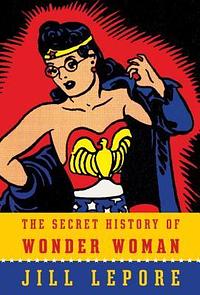Take a photo of a barcode or cover
This was a fascinating look at how wonder woman came to be. But I will say the descriptions I often see touting Marston as progressive and in a polyamorous relationship have a lot more nuance than that. It's not quite the free love story it's made out to be, so if you're going in with those expectations, be warned. Marston and his life and the lives of his wives are more complicated than that, and I appreciated that lepore depicted that in her analysis. Solid read.
*3.5
This book was not, as I was expecting, a history of Wonder Woman the character, but instead the story of the man who created Wonder Woman. Nonetheless, it was still extremely interesting, especially as someone who absolutely loves Wonder Woman
This book was not, as I was expecting, a history of Wonder Woman the character, but instead the story of the man who created Wonder Woman. Nonetheless, it was still extremely interesting, especially as someone who absolutely loves Wonder Woman
informative
medium-paced
This book combines the womens's movement, dawn of birth control and the comics in one tale.
After all her interviews I wanted to read this book and it was a good read, just wish I hadn't learned about most of the content from her interviews, but still worth the read. Wonder Woman, Margaret Sanger, Polyamory....oh my!
The truth really is stranger than fiction. Wonder Woman was created by a man who was kind of a creepy loser, but who was a staunch feminist (except when it came to his home life and harem of three women) with a bondage fetishist. There were a lot of facts in the book which is the reason why I don’t really like non-fiction. Reality doesn’t always lend itself to a proper narrative. But still, I enjoyed this book and am glad to know Amazonian Princess Diana’s true origins, as bizarre as they may be. The book was also very well put together with pictures on almost every other page and a great full color center showing the development of the comic from the ‘40s to the ‘70s.
I thought this book was great. It was interesting to read about how Wonder Woman came to be and all about the guy who wrote it and his woman.
Wonder Woman’s history is closely tied to an incredible amount of groundbreaking moments in american history, going from the suffragist movement, passing through the start of the movie industry and involving the feminist movement in many ways. That sounds obvious but once you start reading and learn just how close and in what ways it truly gets you by surprise.
I’ll be frank and say that Willian Moulton Marston, the creator of Wonder Woman, left me less than impressed. I'll be crass, that guy was fucking shady, there’s no other way to put it. His personal history is messy to say the least, and as the book uncovers his life and the things he’s done, it’s hard to feel sympathy for his troubles or even like him. He had progressive ideas, I won’t take that from him, especially about women’s roles in the world, sexual expression (the guy was kinky as hell) and sexual identity. That said, most of those ideas were mixed with such terrible concepts, or were executed in such terrible ways, he can't be excused.
As progressive as Marston was, he's still a product of a patriarchal/racist culture, and that's reflected in his work and personal life. He wasn’t alone, though, as that happened in many stories going around on comics from the “golden age”. But his description in the book kinda leads you to believe he's the kind of person who'd deny both vehemently. Simply put, Marston was manplaining personified. Also, as the author points out, he never made any effort to have women work on the production of Wonder Woman. It did happen, but more because Joye Hummel, who was hired to type out stories, ended up getting involved than because of any active effort made by anyone there.
Now the women involved with Marston, holy shit. They're the reason Marston's history so interesting, at least for me. Marston married Sadie Elizabeth Holloway, an unconventional woman who persued a rich carreer (mostly financing the entire household), brought a second woman into their lives where she stayed on and off for years and then a third who he also “married”, Olive Byrne, daughter of Ethel Byrne and niece of Margaret Sanger.
Their influence is clear in much of Marston's work, it's arguable that they were behind much of what he published, actually. They were all deeply complex women, although the author refuses to really explore the arrangements they had with Marston and much of what really happened in their house. Perhaps, in respect of the family, who knows. Frankly, it's a mystery why they'd put up with him, maybe it afforded them a decent life in the time they were living, but I digress.
By the end of the book Jill Lepore has shaped the century Wonder Woman is a product of, we understand what actually compelled her creation and what made her last through trying times. It's a great journey, but a limited one, for as much as the book talks about feminism, it lacks a judgement of Marston's themes from a feminist perspective. And, unsurprinsgly (but still saddening) depicts a very non-intersectional feminism. What was life for black/latino women in the century Wonder Woman was born? Did she influence their lives? What were their views? You may say that's not the point of the story, but we had plenty of space to talk about the waves of white feminism she influenced.
It's a great book regardless, well worth the read, but it has space for improvement.
I’ll be frank and say that Willian Moulton Marston, the creator of Wonder Woman, left me less than impressed. I'll be crass, that guy was fucking shady, there’s no other way to put it. His personal history is messy to say the least, and as the book uncovers his life and the things he’s done, it’s hard to feel sympathy for his troubles or even like him. He had progressive ideas, I won’t take that from him, especially about women’s roles in the world, sexual expression (the guy was kinky as hell) and sexual identity. That said, most of those ideas were mixed with such terrible concepts, or were executed in such terrible ways, he can't be excused.
As progressive as Marston was, he's still a product of a patriarchal/racist culture, and that's reflected in his work and personal life. He wasn’t alone, though, as that happened in many stories going around on comics from the “golden age”. But his description in the book kinda leads you to believe he's the kind of person who'd deny both vehemently. Simply put, Marston was manplaining personified. Also, as the author points out, he never made any effort to have women work on the production of Wonder Woman. It did happen, but more because Joye Hummel, who was hired to type out stories, ended up getting involved than because of any active effort made by anyone there.
Now the women involved with Marston, holy shit. They're the reason Marston's history so interesting, at least for me. Marston married Sadie Elizabeth Holloway, an unconventional woman who persued a rich carreer (mostly financing the entire household), brought a second woman into their lives where she stayed on and off for years and then a third who he also “married”, Olive Byrne, daughter of Ethel Byrne and niece of Margaret Sanger.
Their influence is clear in much of Marston's work, it's arguable that they were behind much of what he published, actually. They were all deeply complex women, although the author refuses to really explore the arrangements they had with Marston and much of what really happened in their house. Perhaps, in respect of the family, who knows. Frankly, it's a mystery why they'd put up with him, maybe it afforded them a decent life in the time they were living, but I digress.
By the end of the book Jill Lepore has shaped the century Wonder Woman is a product of, we understand what actually compelled her creation and what made her last through trying times. It's a great journey, but a limited one, for as much as the book talks about feminism, it lacks a judgement of Marston's themes from a feminist perspective. And, unsurprinsgly (but still saddening) depicts a very non-intersectional feminism. What was life for black/latino women in the century Wonder Woman was born? Did she influence their lives? What were their views? You may say that's not the point of the story, but we had plenty of space to talk about the waves of white feminism she influenced.
It's a great book regardless, well worth the read, but it has space for improvement.
Loved this- completely surprising how Wonder Woman was created and in a way it was a little depressing. Super interesting!
A great read, well researched, and entertaining. A very intimate look at the creator of the lie detector and Wonder Woman with an unusual view on feminism. I do wish that the author had gone into more depth of the current state of Wonder Woman, but stopping with the renaissance of Wonder Women with the rise of the Women's Movement of the late 1960s and 1970s makes sense with regard to reasonable page length and the deaths of those involved in the creation.
Book Riot Read Harder Challenge 2015 | Task 10: Microhistory
Book Riot Read Harder Challenge 2015 | Task 10: Microhistory
Catchy title but it would be more accurate to call this The Secret History of William Moulton Marston. This had lots of great history of feminism also which I especially enjoyed. I will read my Wonder Woman comics from an altered perspective from now on.







